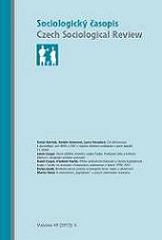Příčiny jednotnosti hlasování a složení legislativních koalic v Senátu ve srovnání s Poslaneckou sněmovnou v letech 1998–2010
A Comparison of the Determinants of Voting Unity and Legislative Coalition Composition in the Senate and the Chamber of Deputies in the Czech Republic
Author(s): Vlastimil Havlík, Kamil GregorSubject(s): Social Sciences
Published by: AV ČR - Akademie věd České republiky - Sociologický ústav
Keywords: parliamentary party groups; party discipline; party unity; party cohesion; Rice index; roll-call voting; legislative behaviour; Senate; Czech Republic
Summary/Abstract: This article aims to perform a first exploratory analysis of the legislative voting structure in the Czech Senate compared to the Chamber of Deputies in 1998–2010. It focuses on the determinants of voting unity of parliamentary party groups measured using the Rice index and on the determinants of the composition of legislative coalitions measured as the relative frequency of majorities formed by two parliamentary party groups voting together. The authors find that patterns of government coalitions are present in both the Senate as and the Chamber of Deputies: senatorial groups of government parties vote more uniformly and more often together than do opposition party groups. The Senate is also less ideological and more consensual than the Chamber of Deputies: a similar ideological profile of two parties in the Senate is a weaker determinant of their senatorial groups voting together. Voting majorities are in general much broader in the Senate than in the Chamber of Deputies.
Journal: Sociologický časopis / Czech Sociological Review
- Issue Year: 49/2013
- Issue No: 04
- Page Range: 549-575
- Page Count: 27
- Language: Czech

